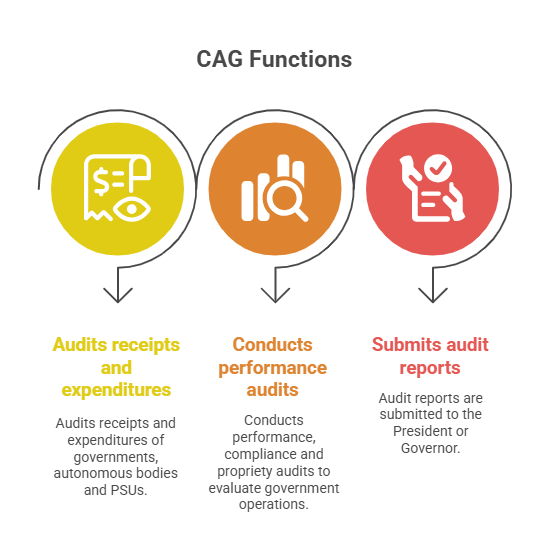-
04 Jul 2025
GS Paper 2
Polity & Governance
Day 17: “The Comptroller and Auditor General of India (CAG) bridges the gap between public expenditure and legislative scrutiny.” Evaluate its effectiveness in maintaining democratic accountability.(150 words)
Approach:
- Briefly introduce the Comptroller and Auditor General (CAG) and its constitutional authority.
- Discuss its contribution to upholding democratic accountability.
- Mention the limitations in CAG’s audit powers.
- Conclude with a suitable way forward.
Introduction :
The Comptroller and Auditor General (CAG) of India, established under Article 148 of the Constitution, is a key constitutional authority ensuring accountability of public funds. As an impartial auditor, the CAG’s reports form the basis of legislative scrutiny, thereby serving as a bridge between executive action and parliamentary oversight.
Body :
CAG’s Contributions to Democratic Accountability
- CAG’s audits have unearthed major scams:
- 2G Spectrum Scam (2010): Estimated loss of ₹1.76 lakh crore due to faulty allocation.
- Coal Block Allocation Scam (2012): Highlighted revenue losses of ₹1.86 lakh crore.
- Commonwealth Games (CWG) Scam: Audited large-scale procurement anomalies.
- These reports became the basis for public debates, parliamentary actions, and in some cases, judicial intervention.
- Performance Audits :
- CAG conducts audits beyond financial compliance—e.g., MNREGA, Sarva Shiksha Abhiyan, and National Health Mission—pointing out leakages, poor outcomes, and inefficiencies. This helped shift the focus from input-based to outcome-based governance.
- Ensuring Executive Accountability
- Through periodic reports, CAG informs the legislature about delays, misappropriation, and underutilization of funds, enhancing transparency. It thus upholds fiscal federalism and integrity in public finance.
Limitations Undermining Effectiveness
- No Enforcement Powers: CAG can only report; it lacks the authority to penalize.
- Delayed Reporting: Reports often come years after expenditure, reducing real-time accountability.
- Limited Follow-Up: Recommendations are advisory; government action is not mandatory.
- PAC Overload: Reports are voluminous; parliamentary committees cannot review all findings effectively.
- Politicization: Audit findings are sometimes selectively cited or undermined for political ends.
Way Forward
- Real-time auditing using digital platforms and AI.
- Ensure time-bound action on recommendations.
- Strengthen PAC with technical experts and domain specialists.
- Promote citizen-centric audit reports for wider public engagement.
- Expand the scope to include climate expenditure, digital governance, and welfare delivery audits.
Conclusion :
As Dr. B.R. Ambedkar rightly remarked, the CAG is "the most important officer in the Constitution of India.” By bridging the gap between expenditure and oversight, the CAG plays a pivotal role in maintaining democratic accountability, though its effectiveness can be enhanced through institutional reforms, timely follow-up, and greater legislative engagement.





